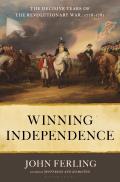Ferling Reputations for Clinton and Cornwallis
I claim only a basic knowledge of the southern campaigns of the Revolutionary War, but I’ve long had the impression that these are the standard assessments of two British commanders:
- Gen. Lord Cornwallis, despite losing at Yorktown, was a competent commander dealing with a nearly impossible mission and undercut by lack of resources from New York.
- Gen. Sir Henry Clinton was a whiny, self-justifying subordinate who wheedled his way into being commander-in-chief; he was then over his head and bears the blame for not sending Cornwallis enough resources.
In WINNING INDEPENDENCE: The Decisive Years of the Revolutionary War, 1778-1781 (Bloomsbury, $40), the veteran historian John Ferling sets out to redeem the reputation of Sir Henry Clinton, the British general who lost that war. As Ferling notes, the conventional view is that Clinton was “capricious, indecisive, overly cautious, muddled and confused, persistently inactive, lacking a strategic vision or a master plan and fatally inhibited by his subliminal sense of inadequacy.” The enjoyment of reading this huge volume is watching Ferling make his case that Clinton was instead “an accomplished, diligent and thoughtful commander.”As I recall, many traditional assessments of Cornwallis went on to point out that he was a competent commander in India later in his career. I wonder if wider regret about British imperialism in India makes that seem less of an accomplishment.
Writing with admirable clarity, Ferling contends that Clinton’s “Southern strategy” of shifting the focus of British military operations to Georgia and the Carolinas was an intelligent move. It might have succeeded, he calculates, had Gen. Charles Cornwallis, who led that effort in the field, not been both mendacious and insubordinate.
Had the Southern gambit worked, Ferling states, the British might have been able to retain much of the South in a peace settlement — perhaps holding on to Georgia, Florida and the Carolinas — and so whittle down the new United States into a precarious position for survival. But Cornwallis undercut Clinton’s strategy by disregarding orders and marching off to Virginia and then getting trapped there, at Yorktown, by the arrival of a French fleet. In the clumsy hands of Cornwallis, Ferling charges, the South became “a quagmire for the British.”


1 comment:
When asked why the South lost the battle of Gettysburg, General Pickett is alleged to have said that "The Union Army had something to do with it." That quote comes to mind when reading about which British General lost the war in the south. I think Nathanael Greene, Daniel Morgan, Thaddeus Kosciusko, the Marquis de Lafayette, et al had something to do with it.
Post a Comment